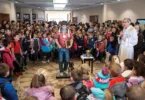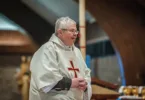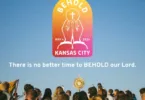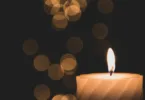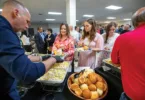by Joe Bollig
joe.bollig@theleaven.org
PURCELL — Establishing a church in frontier Kansas required a lot of faith, hope and charity. And potatoes and corn, too.
St. Mary Parish in Purcell, Doniphan County, celebrated its 150th anniversary by recalling its humble pioneer roots and decades of faithful farm families.
Archbishop Joseph F. Naumann was the main celebrant at the May 30 anniversary Mass, with the pastor, Father Earl Dekat, as concelebrant. A catered dinner was held following the Mass. A display of historical photos, documents and other items was available for viewing, and a video was shown of parish buildings.
Although the actual anniversary date was in October 2008, parishioners decided to hold off celebrating the anniversary until this year when the window restoration was completed.
The first priest to minister to the Catholics in what was then called Normanville was the restless and adventurous Father Henry Lemke, OSB, founder of St. Benedict’s Abbey in Atchison.
Father Henry was succeeded by Father Edmund Langenfelder, OSB, who led the parishioners in the construction of a wood frame church in 1859.
Lumber for the little church was paid for with corn and potatoes, transported by ox-drawn wagons, and driven by Mrs. Francis Schletzbaum and other parishioners to the settlement of Doniphan.
For the next several decades, parish life wasn’t too different from that of many small, rural parishes in the archdiocese. Passions ran hot, however, in the 1890s, when the need for a bigger church led to tensions.
One group wanted to build a new church in Purcell; another group wanted to build at the site of the old church and cemetery. Yet another group wanted simply to enlarge the old church.
Ethnic tensions came into play as the factions divided into Irish and German camps. A history from the 1930s said the parish was “bitterly divided.”
Things got so bad that Bishop Louis M. Fink nixed plans to build a rectory and refused to let the parish build anywhere because of the controversy. That decision in turn generated controversy: There was even some talk of defying the bishop and expanding the old church against the bishop’s explicit orders.
A parish vote settled the controversy in 1896. The pastor said each person could voice his or her opinion, but he didn’t want any “boisterous” language in the church.
The pastor further stipulated that each person had a vote, but a person could “buy” additional votes in $25 increments, each $25 equaling one-fourth of a vote. According to parish records, this was done “to prevent the objection that one part of the people would pay for the Church, whilst the other would locate it.”
A clear majority voted for a new church in Purcell. A three-acre plot of land with a cottonwood grove was donated to the parish, and the discord became history.
“When the railroad came through, they decided to build the church next to the tracks in Purcell,” said Julie Berger, a member of the parish council.
Today, the old school and rectory are gone. The red brick church and the parish hall (originally a gymnasium) remain. Currently, the parish is comprised of 45 families (or 113 members). It no longer has a resident pastor, but shares Father Dekat with St. Leo Parish in adjoining Brown County.
“We’re one big family,” said Berger. “We relate to one another as family and take care of each other.”

